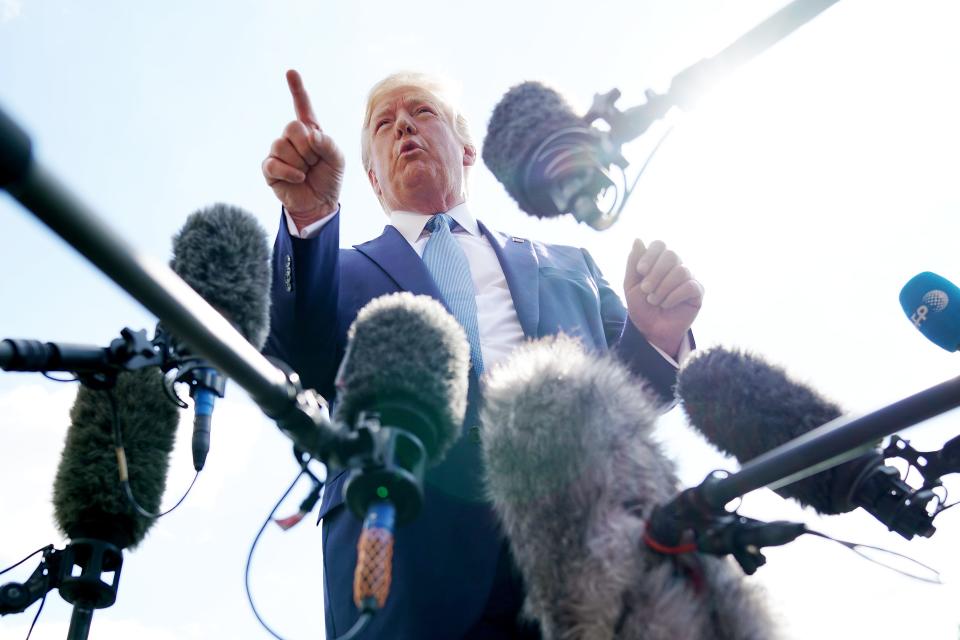Trump has no right to confront the whistleblower who triggered an impeachment inquiry
President Donald Trump says that "like every American," he deserves to meet his accuser ("the so-called 'Whistleblower' ") from the intelligence community. Compared with his earlier statement calling the anonymous whistleblower “almost a spy” and making a thinly veiled reference to execution, the president’s most recent request seems tame — almost reasonable.
In fact, it is anything but. As an attorney who represents courageous individuals who come forward to report fraud in a range of industries, I know just how essential confidentiality is to guarding the safety of whistleblowers and the integrity of the reporting process, and just how dangerous a precedent revealing the whistleblower’s identity could set.
The president is not entitled to “meet my accuser” any more than the general public is entitled to rule on the whistleblower’s credibility.
Retaliation and intimidation risks
As more information emerges on Trump's attempts to get Ukraine to do political favors for him, that notion seems to be up for debate even outside Trump's Twitter account. The New York Times, ignoring the chilling effect on future whistleblowers, revealed details about this whistleblower's employment history.
When faced with a backlash, Executive Editor Dean Baquet responded that “the president himself has called the whistleblower’s account a ‘political hack job,’ ” so the Times “wanted to provide information to readers that allows them to make their own judgments about whether or not he is credible.” Others have echoed the idea that revealing details about the whistleblower would somehow add to the credibility of his accusations.

It’s time to put this idea to rest. Revealing details about the national security whistleblower’s employment history will not further inform the public or help the government determine whether his allegations are credible. The identity of the whistleblower has nothing to do with the credibility of his information.
Consider the various programs that reward and protect whistleblowers who come forward with evidence of fraud in matters involving government agencies. These programs explicitly account for the vulnerability of the person reporting the fraud. Whistleblowers risk retaliation and intimidation, both from within their company and from other potential employers who might blacklist them — especially when they report misconduct at high levels of an organization.
Nobody gets to 'face' their accuser
Maintaining confidentiality is crucial to protecting whistleblowers from threats to their safety and from being ostracized. It is also a way to ensure that potential whistleblowers are not discouraged by these risks and to incentivize them to come forward.
For this reason, the majority of federal whistleblower programs allow people to file reports of fraud under seal. The whistleblower’s confidentiality is preserved even as the government investigates the claim.
How Democrats should impeach Trump: A searing constitutional duty, a plan from two realists
At no time during the government’s investigation into a company or individuals accused of wrongdoing is the target of the investigation entitled or allowed to “face” the accuser. Nor is the whistleblower allowed to discuss the matter with anyone other than his or her attorney.
As part of its investigation, the government may confidentially interview the whistleblower, interview other witnesses or try to corroborate the report with other evidence. The emphasis throughout the investigation is on the credibility of the whistleblower’s allegations, rather than the identity of the person reporting wrongdoing.
Focus on identity is meant to distract
Intelligence community whistleblowers are in an especially precarious position. They have far fewer retaliation and safety protections than private sector whistleblowers. And the heightened media attention often makes them more vulnerable to threats from members of the public.
Case in point: Two Trump supporters offered a $50,000 reward to anyone who could provide further details of the whistleblower’s identity. As a result, the whistleblower’s lawyer reported that his client feared for his safety.
Keep the priorities straight: Pay attention to what Ukraine whistleblower reported, not motivations for speaking out
I know from experience that obsession with the identity of the whistleblower rather than the evidence supporting the allegations is a common tactic used by those accused of fraud. De-emphasizing the national security whistleblower’s identity and focusing on the evidence that results from his information should be our collective priority.
The House Ways and Means Committee is now investigating a federal whistleblower's report of improper influence at the Treasury Department in connection with a mandatory audit of Trump's taxes, and other intelligence officials are coming forward on the Ukraine allegations. We need to show these and future whistleblowers that we can get this right.
Debating the merits of revealing the national security whistleblower’s identity distracts from the investigation and the evidence it develops. That plays right into the hands of those seeking to detract from the gravity of the accusations against the president.
We should not fall into this trap.
Noelle Yasso is a whistleblower attorney at Constantine Cannon.
You can read diverse opinions from our Board of Contributors and other writers on the Opinion front page, on Twitter @usatodayopinion and in our daily Opinion newsletter. To respond to a column, submit a comment to letters@usatoday.com.
This article originally appeared on USA TODAY: Trump impeachment: Nobody has right to face a whistleblower accuser

